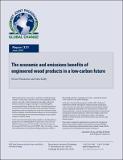The economic and emissions benefits of engineered wood products in a low-carbon future
Author(s)
Winchester, Niven Stewart; Reilly, John M
DownloadMITJPSPGC_Rpt331.pdf (895.0Kb)
Metadata
Show full item recordAbstract
There has been rapid growth in the use of engineered wood products in the construction sector in recent decades. We evaluate the economy-wide impacts of replacing carbon-intensive construction inputs, such as steel and cement, with lumber products in the US under an emissions constraint. We find that the ability to substitute lumber-based building materials increases production from the lumber and forestry sectors and decreases production from carbon-intensive sectors such as cement. Under a carbon cap-and-trade policy, the ability to substitute lumber products lowers the carbon price and the GDP cost of meeting the carbon cap, with more overall emissions abatement in the construction industry.
Date issued
2018-06Publisher
MIT Joint Program on the Science and Policy of Global Change
Citation
Report 331
Series/Report no.
MIT Joint Program Report Series;331